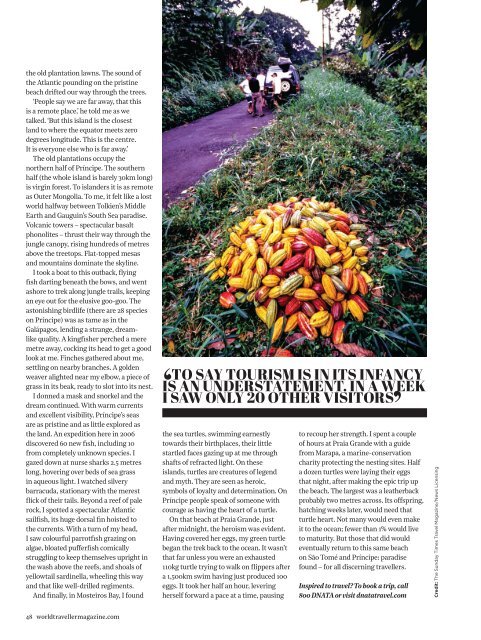Create successful ePaper yourself
Turn your PDF publications into a flip-book with our unique Google optimized e-Paper software.
the old plantation lawns. The sound of<br />
the Atlantic pounding on the pristine<br />
beach drifted our way through the trees.<br />
‘People say we are far away, that this<br />
is a remote place,’ he told me as we<br />
talked. ‘But this island is the closest<br />
land to where the equator meets zero<br />
degrees longitude. This is the centre.<br />
It is everyone else who is far away.’<br />
The old plantations occupy the<br />
northern half of Príncipe. The southern<br />
half (the whole island is barely 30km long)<br />
is virgin forest. To islanders it is as remote<br />
as Outer Mongolia. To me, it felt like a lost<br />
world halfway between Tolkien’s Middle<br />
Earth and Gauguin’s South Sea paradise.<br />
Volcanic towers – spectacular basalt<br />
phonolites – thrust their way through the<br />
jungle canopy, rising hundreds of metres<br />
above the treetops. Flat-topped mesas<br />
and mountains dominate the skyline.<br />
I took a boat to this outback, flying<br />
fish darting beneath the bows, and went<br />
ashore to trek along jungle trails, keeping<br />
an eye out for the elusive goo-goo. The<br />
astonishing birdlife (there are 28 species<br />
on Príncipe) was as tame as in the<br />
Galápagos, lending a strange, dreamlike<br />
quality. A kingfisher perched a mere<br />
metre away, cocking its head to get a good<br />
look at me. Finches gathered about me,<br />
settling on nearby branches. A golden<br />
weaver alighted near my elbow, a piece of<br />
grass in its beak, ready to slot into its nest.<br />
I donned a mask and snorkel and the<br />
dream continued. With warm currents<br />
and excellent visibility, Príncipe’s seas<br />
are as pristine and as little explored as<br />
the land. An expedition here in 2006<br />
discovered 60 new fish, including 10<br />
from completely unknown species. I<br />
gazed down at nurse sharks 2.5 metres<br />
long, hovering over beds of sea grass<br />
in aqueous light. I watched silvery<br />
barracuda, stationary with the merest<br />
flick of their tails. Beyond a reef of pale<br />
rock, I spotted a spectacular Atlantic<br />
sailfish, its huge dorsal fin hoisted to<br />
the currents. With a turn of my head,<br />
I saw colourful parrotfish grazing on<br />
algae, bloated pufferfish comically<br />
struggling to keep themselves upright in<br />
the wash above the reefs, and shoals of<br />
yellowtail sardinella, wheeling this way<br />
and that like well-drilled regiments.<br />
And finally, in Mosteiros Bay, I found<br />
‘<br />
TO SAY TOURISM IS IN ITS INFANCY<br />
IS AN UNDERSTATEMENT. IN A WEEK<br />
I SAW ONLY 20 OTHER VISITORS<br />
’<br />
the sea turtles, swimming earnestly<br />
towards their birthplaces, their little<br />
startled faces gazing up at me through<br />
shafts of refracted light. On these<br />
islands, turtles are creatures of legend<br />
and myth. They are seen as heroic,<br />
symbols of loyalty and determination. On<br />
Príncipe people speak of someone with<br />
courage as having the heart of a turtle.<br />
On that beach at Praia Grande, just<br />
after midnight, the heroism was evident.<br />
Having covered her eggs, my green turtle<br />
began the trek back to the ocean. It wasn’t<br />
that far unless you were an exhausted<br />
110kg turtle trying to walk on flippers after<br />
a 1,500km swim having just produced 100<br />
eggs. It took her half an hour, levering<br />
herself forward a pace at a time, pausing<br />
to recoup her strength. I spent a couple<br />
of hours at Praia Grande with a guide<br />
from Marapa, a marine-conservation<br />
charity protecting the nesting sites. Half<br />
a dozen turtles were laying their eggs<br />
that night, after making the epic trip up<br />
the beach. The largest was a leatherback<br />
probably two metres across. Its offspring,<br />
hatching weeks later, would need that<br />
turtle heart. Not many would even make<br />
it to the ocean; fewer than 1% would live<br />
to maturity. But those that did would<br />
eventually return to this same beach<br />
on São Tomé and Príncipe: paradise<br />
found – for all discerning travellers.<br />
Inspired to travel? To book a trip, call<br />
800 DNATA or visit dnatatravel.com<br />
Credit: The Sunday Times Travel Magazine/News Licensing<br />
48 worldtravellermagazine.com

















